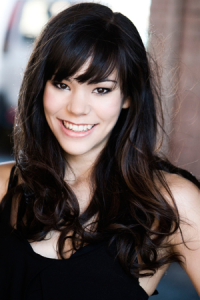
Q & A: Australian Soprano Janet Szepei Todd On ‘Madama Butterfly’ in Japanese & ‘Opera di Facebook’
By Gordon WilliamsPacific Opera Project’s “Madama Butterfly,” presented recently in Los Angeles’ Little Tokyo, was acclaimed for presenting Puccini’s opera in Japanese and English, the languages the characters would actually have spoken.
But one of the other talking points around town was the “last-minute” assumption of the title role by Melbourne-born soprano, Janet Szepei Todd. OperaWire caught up with Janet at Cafe Solar de Cahuenga in Hollywood and spoke to her about this experience and other upcoming projects.
OperaWire: It was amazing that you landed that opportunity. And apparently, you had a week’s notice?
Janet Szepei Todd: It was a very last-minute thing. Just before rehearsals started Josh Shaw, the founder of POP and this production’s director, called me and said, “We want a back-up – just for emergencies. I know you’ve sung the role in Columbus.”
OW: But that would have been in Italian?
JST: Yes. He said, “Mostly we just want a safety-net.” But a week before opening night, he called me and said, “How fast can you learn Japanese?” Because when it came down to it, the whole point of the production was that it was in Japanese. So I had a lot of coaching with Eiki Isomura, the conductor and co-librettist who was a very efficient teacher and I just worked at it. I thought Eiki’s translation was really beautiful. But it was also very true to the Italian, so learning it was easier because I already had a sense of each phrase.
OW: Sitting there, I just had to kind of divine that it was actually lyrical Japanese.
JST: Some things were difficult. Some notes are just on an “n” so you have to sing through. Another point of interest is the “u”’ vowel. It’s a sound that is completely different from any of our vowels in English, and very different again from the closed French “u” vowel or the German “ü,” even though reminiscent of the German. So that brand new vowel sound was another challenge. Once I got my head around some of the major differences though, it was actually lovely to sing in.
OW: How did you start out your career as a singer?
JST: I’m from Melbourne. My singing teacher in high school was an opera singer so she got me to do a lot of youth operas and I went through the Victorian College of the Arts [VCA, in Melbourne] and for about five years after VCA I was working for different companies and singing around Australia but I really wanted to do more study. I’d come on a study trip over here and just fell in love with New York and wanted to live there. I’d had a lot of help through the Melba Opera Trust, and part of the reason why I moved over here is because I had a mentorship through that.
OW: So the Melba Trust was set up by the Melbourne-born soprano to encourage Australian singers?
JST: There was originally the Melba Conservatorium endowed by Dame Nellie with a generous bequest after her death in 1931 but when that closed they turned that into the Melba Trust.
OW: What is Australia like as a nurturing ground for singers?
JST: There are some really high-quality teachers in the conservatoria and I think a lot of the companies like to nurture young singers. Melbourne University has a Master of Music (Opera Performance) which offers industry placements with Australian or overseas companies.
OW: But you found Australia incredibly supportive?
JST: Especially Victorian Opera when I started out. Richard Gill gave me my first chance to sing with them as Pamina in “The Magic Flute.”
OW: And you also did Pamina in Opera on the Beach?
JST: Opera Australia does those location spectaculars, like Opera on the Harbour, and this one they did in Coolangatta on the Gold Coast and it was literally on the beach. It was a huge stage, a huge set. They had 3,000 people all bringing their seats and picnic rugs and they had fireworks at the end. The water was right there, crashing in.
OW: What was it like competing with the surf?
JST: Actually, we were far enough away. It was a deep beach so it was probably about 20 meters between where we were and high tide.
OW: Tell us about “L’opera di Facebook.”
JST: These are short comic opera films written and directed by filmmaker Adam Taylor and composed by Nathan Fletcher. They’re short and fun, and are written around topics we can all relate to. Adam’s actually just released another called “Rumspringawakening”, about this Amish boy who goes on Rumspringa, the Amish adolescent rite of passage, in New York and meets a girl there handing out flyers for an Amish-themed musical on Broadway.
OW: It’s kind of opera that people can access really quickly, on YouTube, and it’s not going to take up much time.
JST: And you don’t have to pay for it.
OW: What’s next for you?
JST: I’m singing two more shows with POP this year. And coming up, a couple of New Music events and LA Chorus next season. I’m just trying to do as much as I can. Because I’ve been here about a year and it takes time.
OW: But you’ve had a starring role in an opera that got broad media coverage.
JST: It’s funny how these things happen. You’re a cover and suddenly you’re thrust on stage.


